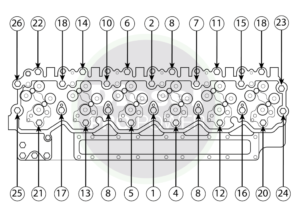Why Torque Specs Are Important For Your Marine Diesel Engine Repairs

Torque specifications are crucial when performing repairs on marine diesel engines from brands such as Detroit Diesel, Cummins, and Caterpillar. Ensuring each fastener is tightened to the manufacturer’s recommended torque value is vital for engine performance, safety, and longevity. By following torque specs, you help prevent costly engine failures, maintain engine efficiency, and prolong your vessel’s life.
In the video below Diesel Pro Power, Inc. technicians install a Cylinder head onto a 6-71 block. They have to torque the head to the block following the Detroit Diesel torque specifications found in the manual for the Detroit Diesel 671 engine.
Let’s dive deeper into why torque specs are so important for these powerful marine engines.
1. Preventing Engine Failure
Proper torque values ensure that engine components, such as cylinder heads and main bearings, are fastened correctly. Marine engines operate under high pressure and temperature, and incorrect torque can lead to fastener failure:
- Over-torquing can cause bolt stretch, thread stripping, or even cracking of components.
- Under-torquing can result in vibration, loosened bolts, or gasket failure, leading to catastrophic engine breakdowns.
Engines like the Detroit Diesel 6-71, Cummins 6CTA, or Caterpillar 3406 require precision when torquing bolts to prevent these types of damage. Failure to follow the proper specs can lead to costly repairs or, worse, leave you stranded at sea.
2. Ensuring Proper Sealin
Correct torque specs are essential for maintaining proper seals in areas like cylinder heads and gaskets. Over-torquing or under-torquing can damage seals, leading to coolant or oil leaks:
- Cylinder heads and other critical gaskets must be torqued to manufacturer specs to prevent leakage and maintain compression.
- A failure to achieve proper torque could result in compression loss or fluid leaks, which can quickly escalate into major engine issues.
3. Maintaining Engine Efficiency
Marine diesel engines are designed for high efficiency, and proper torque specs play a role in maintaining that efficiency:
- Excessive torque can create excess stress on engine components, increasing friction and lowering fuel efficiency.
- Insufficient torque can lead to poor combustion, engine misfires, and vibrations that decrease overall performance.
Torque specs help marine engines such as the Cummins QSB 6.7, Detroit Diesel 8V92, or Caterpillar 3516 perform optimally, ensuring your engine is running efficiently and economically.
4. Prolonging Engine Life
Proper torque settings prevent over-stressing engine parts, helping you avoid costly premature wear:
- Components like crankshafts, connecting rods, and bearings depend on accurate torque settings to distribute load evenly.
- Incorrect torque can lead to fatigue failure of these components, shortening the life of your engine.
For instance, if your Caterpillar 3412 engine is improperly torqued during repairs, it could drastically shorten the life of expensive parts like bearings and gaskets.
5. Safety Considerations
Improper torque settings can result in major safety hazards for marine engines. A failure in a key component such as a main bearing cap or turbocharger due to incorrect torque can cause engine failure or fires in confined engine rooms.
- In a marine environment, where repairs may be difficult and remote, ensuring the safety and reliability of your engine through proper torque specs is critical.
6. Following Manufacturer Guidelines
Every engine manufacturer provides specific torque values in their service manuals for a reason. These torque specs are carefully engineered to ensure that the engine operates reliably and safely. Whether you are working on Detroit Diesel, Cummins, or Caterpillar engines, following the manufacturer’s torque guidelines is crucial. At Diesel Pro Power, we provide several torque spec resources to help you get the job done right:
Cummins Engine Torque Specs

Torque Specs For Cummins ISC, QSC, ISL, & QSL
Torque Specs For Cummins KTA19 Marine Engines
Torque Specs For Cummins 6CTA 8.3 Marine Engines
Torque Specs For Cummins B Series Marine Engines
Detroit Diesel Engine Torque Specs

Torque Specs For Detroit Diesel 71 Series Engines (Not Including 2-Cylinder)
Conclusion
Torque specs are essential for ensuring the reliability, efficiency, and safety of marine diesel engines. By adhering to manufacturer-recommended torque specs, you can prevent engine failures, ensure proper sealing, maintain engine efficiency, and prolong the life of critical components. Whether you are working on Detroit Diesel, Cummins, or Caterpillar engines, the correct torque values are key to ensuring your engine operates smoothly and reliably in marine environments.
For high-quality parts and additional resources to maintain your marine engines, visit Diesel Pro Power.



 Free US Calls: 1-888-433-4735
Free US Calls: 1-888-433-4735 International: 305-545-5588
International: 305-545-5588